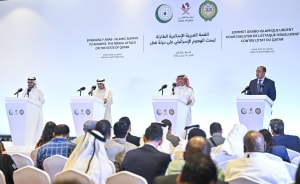Five years in, the Abraham Accords are braving their toughest challenge
The rationale for peace with Israel remains solid

It is easy to be pessimistic about the prospects of peace between Israel and its Arab neighbors at the five-year mark of the historic Abraham Accords.
Especially after a show of unity by nearly 60 Arab and Muslim nations, who called to “review diplomatic ties” with the Jewish State in the wake of the Israeli strike in Doha, along with the usual condemnations.
The much-discussed addition of Saudi Arabia to the Accords, which seemed imminent before the war, seems to be off the table for now, and possibly for many years to come.
However, despite concerning talk of “red lines,” public criticism and the downgrading of economic ties, we can’t lose sight of a simple fact: Despite two years of war in Gaza, the Abraham Accords are still intact.
“If you had asked on October 7 whether the Abraham Accords would hold through two years of war, tens of thousands of deaths, widespread destruction in Gaza — a lot of people would have said maybe not,” Asher Fredman, executive director of the Misgav Institute for National Security, told The Media Line.
The accords were not made as a favor to Israel but out of strategic interests, and the last five years of peace between the Jewish State and the United Arab Emirates, Bahrain, and Morocco have been an unmitigated success for each of the countries.
Unlike previous treaties with Egypt and Jordan, which were also strengthened by them, the Abraham Accords were accompanied by an (at least initial) outreach between peoples, which enabled the rapid expansion of trade and tourism.
According to Fredman, Israel’s trade with Morocco, Egypt, and Jordan continued to rise in the first half of 2025, while trade with Bahrain and the UAE is now returning to the levels of 2023, after a dip due to the war.
In Bahrain, the least prominent member country, “Public sentiment… remains overwhelmingly pro-Palestinian,” writes Ahmed Khuzaie for the Atlantic Council.
However, in addition to increased trade, normalization with Israel has also reinforced Bahrain’s position as a U.S. ally in the region. The island country hosts the U.S. Fifth Fleet, has taken part in U.S.-led naval coalitions, and has also received new prominence as a diplomatic player.
Israel and Morocco might have the closest people-to-people connections, given that hundreds of thousands of Israelis or their parents were born in Morocco. Many of them have visited their old country over the past five years.
However, as in Bahrain, the bulk of the population is still hostile to Israel. Last year, the Princeton University Arab Barometer found that support for normalization with Israel fell from 31 percent in 2021 to only 13 percent.
But like in Bahrain, the positives outweigh the negatives for the country’s leadership.
King Mohammed VI is preparing his heir, Crown Prince Moulay Hassan, for a succession, noted Sarah Zaaimi for the Atlantic Council.
“This effort translates into ambitious infrastructure and development initiatives, alongside strategic alliances with global powers to secure a lasting resolution to the Western Sahara dispute and cement the kingdom’s fate,” she wrote.
The normalization with Israel, she writes, is therefore a “calculated move to position Rabat as a dependable pro-Western, pan-Abrahamic partner in North Africa—consolidating the future of the throne.”
In return for normalization, the U.S. recognized Moroccan sovereignty over the Western Sahara, which has long been a major goal for the kingdom.
It has also profited from closer ties through access to Israel’s high-tech weapons, having bought three Heron drones for approximately $48 million, SkyLock Dome anti-drone systems for $500 million and Barak MX missile systems for another $500 million, while a $1 billion deal for an Israeli-made spy satellite is still in the works.
The ties between Israel and the UAE can be seen as the closest on the diplomatic level, but they have been sorely tested over the past two years.
Amid recent discussions in Israel about a possible annexation of parts of Judea and Samaria, a senior Emirate official even warned this would be “a red line” and that this would mean that “there can be no lasting peace. It would foreclose the idea of regional integration and be the death knell of the two-state solution.”
However, the original rationale for the accords remains true for the UAE as well and might even be more relevant than before.
The historic deal was presented as an inversion of the traditional approach that a solution to the Palestinian issue, including a Palestinian state, would be a prerequisite to any regional integration of Israel.
But, the signees argued, they could now use the leverage of the peace agreements to start providing the Palestinians concrete support and argue on their behalf. An immediate expression of this was the fact that the UAE explicitly demanded the halting of annexation plans as a condition to join the agreement.
While Arab officials have often lamented their lack of ability to influence the Israeli government, the Abraham Accords remain overwhelmingly popular in Israel, and it is unlikely that the public would support their effective abrogation “just” to annex some parts of Judea and Samaria.
In addition, the UAE has, in fact, been able to use its contacts with Israel to become one of the Palestinians’ major benefactors. In Gaza, the Emirates have supplied tons of aid via land and air, built hospitals, and evacuated patients to the UAE for advanced treatments.
And once Israel and the U.S. decide on a policy for Gaza after the war, the UAE will surely have a role to play.
Bent and dinged but not broken, the Abraham Accords are here to stay – but this moment of crisis clearly outlined limitations to their future expansion.
Ironically, the American strikes on Iran’s nuclear program reversed a major strategic rationale for Saudi Arabia to join the accords, as the Iranian threat and combined Israeli and U.S. support against it were an important motivation.
Hamas’ invasion, the subsequent Israeli ground operations, and the terror group’s propaganda campaign have forced all regional actors to fall in line with a hardened anti-Israel and pro-Palestinian stance, eliminating any room for maneuver and compromise on the two-state issue.
After their repeated public commitments, the situation will have to change drastically – or, alternatively, some time will have to pass – until Saudi Arabia and other regional states can compromise again on their demands for a Palestinian state and their resolute rejections of any Israeli annexations in Judea and Samaria, as well as Gaza.
Which brings us back to the start – 60 nations called to “review” diplomatic ties and harshly condemned Israel, but the Abraham Accords still stand.
Another sign of the treaty's durability and future prospects is that the possibility of Syria and Lebanon joining the accords has been discussed even while the war still continues.
After the war ends, or once it truly starts to wind down, global focus of attention will move elsewhere, as it has always done in the past.
The media and diplomatic pressure will decrease, and the Israeli government will then receive another chance to strengthen, and maybe even expand, the Abraham Accords once again.

Hanan Lischinsky has a Master’s degree in Middle East & Israel studies from Heidelberg University in Germany, where he spent part of his childhood and youth. He finished High School in Jerusalem and served in the IDF’s Intelligence Corps. Hanan and his wife live near Jerusalem, and he joined ALL ISRAEL NEWS in August 2023.
You might also like to read this:

















